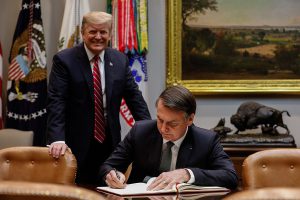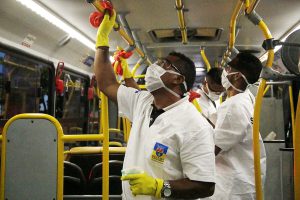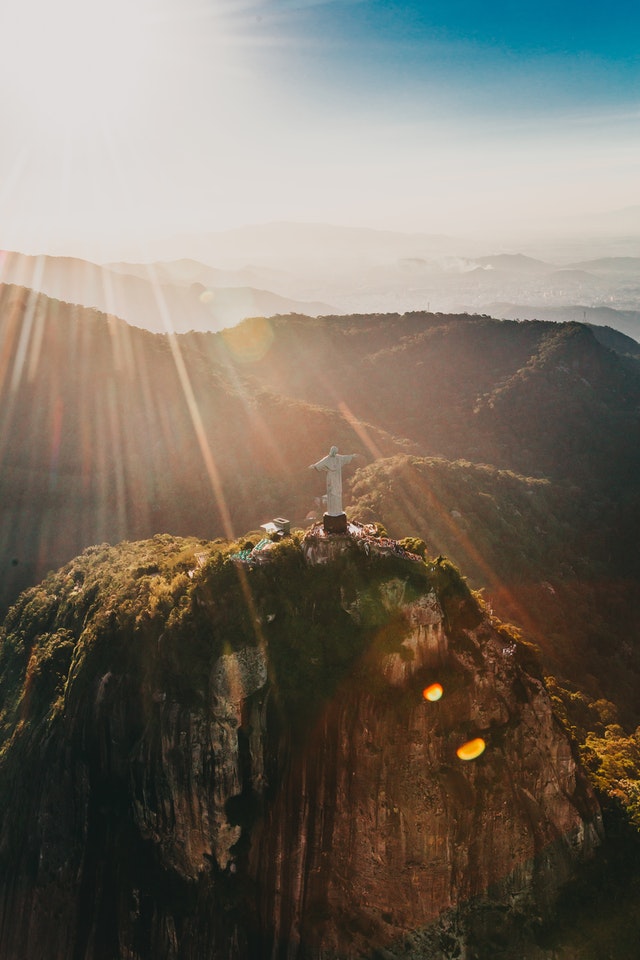For more than a week of warm mid-March evenings, the sound of clanging pots and pans echoed out across São Paulo and Rio de Janeiro.
In a simple act of frustration and unity, thousands of Brazilians—confined to their homes due to regional lockdown orders to counter the coming COVID-19 pandemic—let their neighbors know exactly what they thought of President Jair Bolsonaro.
Like President Donald Trump, Bolsonaro, a rare international ally of the controversial American leader, downplayed the threat of the novel coronavirus in the early days, equating it to a “little flu.”
“The people will soon see that they were tricked by these governors and by the large part of the media when it comes to coronavirus,” Bolsonaro said, in a tense television interview on March 21.
International bodies should take a closer look at what is happening—or, all too often, what is not happening—in Brazil that has led it to become one of the global pandemic’s top victims.
At that point, Brazil had 1546 total cases and 25 deaths.
Four months later, over 76,000 Brazilian have died of COVID-19. More than two million have been infected.
Last week, Bolsonaro himself became contracted COVID-19.
By the official numbers, the nation is now the second-worst hit in the world from the COVID-19 pandemic, trailing only the United States.
Due to a shortage of testing, experts believe that Brazil’s actual case numbers could be closer to 10 million infected, while University of Washington research suggested its death toll could reach 200,000 by November.
With a population of close to 210 million, firm, consistent public health messaging was always going to be key if Brazil was able to keep COVID-19 at bay.
As many followed the lead of their president, the clear failure to contain the pandemic has mirrored that of the U.S in a multitude of aspects (the U.S. restricted flights from Brazil in late May).
A leader in pandemic denial
Brazil reported its first COVID-19 case in late February, in a businessman who returned from a trip to Italy. Within a fortnight, state governors enacted stay-at-home orders that would lead to the night-time pot banging.

In mid-March, Bolsonaro had only just returned from a diplomatic trip to the United States, where he met with Trump. Later, it was revealed that several members of the Brazilian delegation tested positive for COVID-19.
Other leaders might be spooked into action by an outbreak amongst their closest staff, but not Bolsonaro.
“Other viruses have killed many more than this one and there wasn’t all this commotion,” Bolsonaro told media in late March.
Experts were ignored, health ministers sacked, and large rallies were still held by the belligerent leader, who, for months, refused to wear a mask in public.
Bolsonaro labeled regional and city lockdowns ‘crimes’ that could destabilize the Brazilian economy, while promoting the use of hydroxychloroquine, an anti-malaria drug that likely has no impact on treating COVID-19.
At least 11 Brazilians have died from taking too much hydroxychloroquine.
“Both [Bolsonaro and Trump] were incredibly slow to recognize the outbreak and to listen to experts who were calling for immediate action,” Steven Levitsky, a Latin America expert at Harvard University, told USA Today.
Like in the States, Brazilian states have done much of the heavy lifting when it has come to preventative health measures. Interstate travel has been restricted, while social distancing and mask-wearing have become normal.
Yet with testing still limited, and the government almost certainly fudging the COVID-19 numbers they have counted, there is only so much governors can do. In São Paulo, the healthcare system is “near collapse.”
“When governments disregard reasonable or appropriate public health measures, the moral vacuum only further increases marginalization, extreme poverty, and violence in the entire region,” The Regulatory Review wrote last month.

“International bodies should take a closer look at what is happening—or, all too often, what is not happening—in Brazil that has led it to become one of the global pandemic’s top victims.”
Incredibly, that position, combined with Brazil’s existing scientific infrastructure, could play a massive role in developing an effective vaccine to combat COVID-19.
Brazil’s COVID ‘lab’
Of the 163 COVID-19 vaccines currently being developed around the world, only two have reached the important Phase Three trials that see them tested on humans on a large scale. Both will be trialled in Brazil, with ‘advanced talks’ underway to test three more.
The first of the vaccine trials, developed by the United Kingdom’s Oxford University and American pharmaceutical company AstraZeneca, began on June 28, with 5000 volunteers. Most of them were medical workers.
The second, created by Chinese biotech firm Sinovac, will begin their 9000-person trial across Brazil next week. Collaboration with well-resourced local universities, health institutes and labs has played an important role in making the mass human trials happen.
[Brazil] offers an unusual and appealing mix for research: a skyrocketing rate of transmission, as well as internationally respected research centers and a public health system experienced in creating and distributing vaccines.
With around 100 million flu vaccines—the most in the Southern Hemisphere—produced by São Paulo’s Butantan Institute last year, Brazil’s logistical capacity to process a vaccine is already more impressive than most nations.
Along with the Zika Virus, small swine flu outbreaks in 2009 and 2016 gave Brazilian scientists a chance to observe a contained pandemic in action, providing crucial lessons.
“[Brazil] offers an unusual and appealing mix for research: a skyrocketing rate of transmission, as well as internationally respected research centers and a public health system experienced in creating and distributing vaccines,” CNN reported, in an extensive investigation into the situation yesterday.
Brazil’s position as COVID-19 vaccine ‘lab’ is a win-win for its citizens too, with its government negotiating the right to mass produce both initial trialed vaccines if proven effective (initial results from the Oxford-Astrazeneca trial are expected next week).
Despite the obstacles—many of which are Bolsonaro-shaped—there’s every chance the first person to be cured of COVID-19, via vaccine, will be a Brazilian.
When asked what that would mean, Julio Barbosa, a nursing technician who is participating in the Oxford-Astrazeneca phase three trial, gave CNN a near-perfect Brazilian response.
“I’ve been dreaming about this,” he said.
“The first thing I would do is go to a samba, and hug my friends. I would even lick the beer that drips on the counter.”





